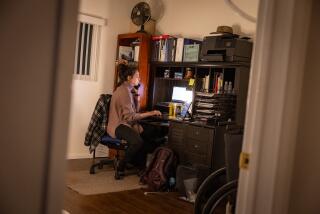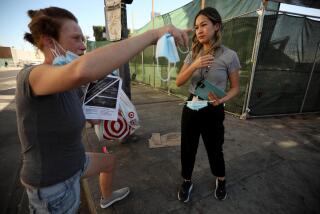COVER STORY : For Women, AIDS Virus A Separate Kind of Pain
- Share via
Connecting with support groups in North County has given Elizabeth and Kathy what they needed: people with whom they could share their pain, anger and fear.
Both are living with a deadly secret. They carry the AIDS virus. As heterosexual women, they are in the fastest-growing category of those infected with the disease.
Elizabeth and Kathy have never met. Elizabeth, 45, lives in Oceanside; Kathy, 29, in Encinitas. Both contracted the AIDS virus from their husbands. After long struggles with the complications of the disease, their husbands died last year.
Both women consented recently to interviews if their real names would not be published.
Elizabeth is a nurse at a North County hospital. She hasn’t told her employer or her co-workers of her condition, fearing she’ll lose her job. She performs no procedures that would put a patient at risk of contracting the virus from her.
Elizabeth shares a rented house with a male roommate. He just moved in. She’s been afraid to tell him she is HIV-positive.
After her husband died in September, Elizabeth finally told her children from a previous marriage that in 1988 she was found to have the AIDS virus. It took her a little longer, but she also eventually broke the news to her parents. A couple of friends know, too. To everyone else, Elizabeth appears to be a healthy working woman. No one knows what’s pent up inside her.
“It’s hard to find people to talk about it,” Elizabeth said. “How do I get past this anger? The fear of disclosing my situation?”
Up until a few months ago, when four new support groups were started in North County, raising the total number to five, Elizabeth had been frustrated by the inability to find people who understood her emotional plight.
She gave up on driving to groups in San Diego, and she found herself unsatisfied with a group in Vista--the only one in North County at the time--that included those with the virus as well as their families and friends. She even tried forming her own group, with no success.
Now, however, she’s finally feeling some relief from a women’s-only group in Vista that was one of the four recently started.
“I know I’m not the only woman in North County who is HIV-positive,” Elizabeth said. “Now I know there are at least three or four.”
Kathy is another.
Just after she was married five years ago, Kathy’s husband became sick and his condition was diagnosed as AIDS.
After he died last year, Kathy left the state where they lived and came to California to enjoy better weather and to be closer to her mother.
Then she got sick four months ago and was found to have AIDS. She’s been more or less on her own ever since.
Kathy doesn’t see much of her mother anymore. “Since she’s found out that I have it, she doesn’t really want to deal with it,” Kathy said. “So we just avoid each other.”
A bubbly, upbeat person, Kathy shares a two-bedroom apartment with a male roommate she found through a friend. He doesn’t know about her condition. She hasn’t told him because she relies on him to split the rent.
“I just don’t want anybody to be afraid of me,” she said.
With the alternating days of sickness and relative health she has been experiencing, which is common with AIDS, Kathy cannot hold a job. She relies on Social Security and other financial and medical assistance to survive. Still, those programs can’t lift the weight of the secret she carries with her.
Knowing she needed someone to talk to about her situation, Kathy went looking for a support group. After a long and frustrating search in which she was referred from one agency to the next, she finally found a group that had just been formed. It meets weekly at Scripps Memorial Hospital in Encinitas.
Kathy said that finally being able to open up to others has reassured her that she’s not completely alone in her struggle. Still, being a woman with the disease sets her apart from others in the group, she said. She’s considering attending Elizabeth’s group for women only, where she could talk more freely about what the virus is doing to her body.
“Women go through a lot of different things than men do,” she said.
More to Read
Sign up for Essential California
The most important California stories and recommendations in your inbox every morning.
You may occasionally receive promotional content from the Los Angeles Times.













